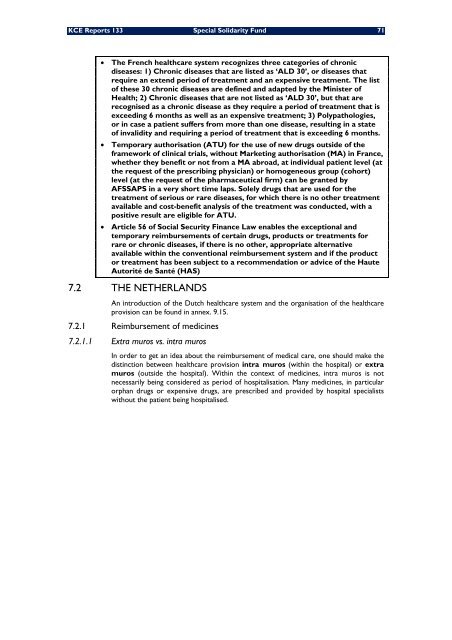Optimalisatie van de werkingsprocessen van het Bijzonder ... - KCE
Optimalisatie van de werkingsprocessen van het Bijzonder ... - KCE
Optimalisatie van de werkingsprocessen van het Bijzonder ... - KCE
Create successful ePaper yourself
Turn your PDF publications into a flip-book with our unique Google optimized e-Paper software.
<strong>KCE</strong> Reports 133 Special Solidarity Fund 71<br />
• The French healthcare system recognizes three categories of chronic<br />
diseases: 1) Chronic diseases that are listed as ‘ALD 30’, or diseases that<br />
require an extend period of treatment and an expensive treatment. The list<br />
of these 30 chronic diseases are <strong>de</strong>fined and adapted by the Minister of<br />
Health; 2) Chronic diseases that are not listed as ‘ALD 30’, but that are<br />
recognised as a chronic disease as they require a period of treatment that is<br />
exceeding 6 months as well as an expensive treatment; 3) Polypathologies,<br />
or in case a patient suffers from more than one disease, resulting in a state<br />
of invalidity and requiring a period of treatment that is exceeding 6 months.<br />
• Temporary authorisation (ATU) for the use of new drugs outsi<strong>de</strong> of the<br />
framework of clinical trials, without Marketing authorisation (MA) in France,<br />
w<strong>het</strong>her they benefit or not from a MA abroad, at individual patient level (at<br />
the request of the prescribing physician) or homogeneous group (cohort)<br />
level (at the request of the pharmaceutical firm) can be granted by<br />
AFSSAPS in a very short time laps. Solely drugs that are used for the<br />
treatment of serious or rare diseases, for which there is no other treatment<br />
available and cost-benefit analysis of the treatment was conducted, with a<br />
positive result are eligible for ATU.<br />
• Article 56 of Social Security Finance Law enables the exceptional and<br />
temporary reimbursements of certain drugs, products or treatments for<br />
rare or chronic diseases, if there is no other, appropriate alternative<br />
available within the conventional reimbursement system and if the product<br />
or treatment has been subject to a recommendation or advice of the Haute<br />
Autorité <strong>de</strong> Santé (HAS)<br />
7.2 THE NETHERLANDS<br />
An introduction of the Dutch healthcare system and the organisation of the healthcare<br />
provision can be found in annex. 9.15.<br />
7.2.1 Reimbursement of medicines<br />
7.2.1.1 Extra muros vs. intra muros<br />
In or<strong>de</strong>r to get an i<strong>de</strong>a about the reimbursement of medical care, one should make the<br />
distinction between healthcare provision intra muros (within the hospital) or extra<br />
muros (outsi<strong>de</strong> the hospital). Within the context of medicines, intra muros is not<br />
necessarily being consi<strong>de</strong>red as period of hospitalisation. Many medicines, in particular<br />
orphan drugs or expensive drugs, are prescribed and provi<strong>de</strong>d by hospital specialists<br />
without the patient being hospitalised.

















